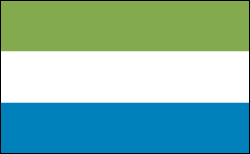Sierra Leone History


A Decade-Long Civil War
But a violent military coup ousted President Kabbah's civilian government in May 1997. The leader of the coup, Lieut. Col. Johnny Paul Koroma, assumed the title Head of the Armed Forces Revolutionary Council (AFRC). Koroma began a reign of terror, destroying the economy and murdering enemies. The Commonwealth of Nations demanded the reinstatement of Kabbah, and ECOMOG, the Nigerian-led peacekeeping force, intervened. On March 10, 1998, after ten months in exile, Kabbah resumed his rule over Sierra Leone. The ousted junta and other rebel forces continued to wage attacks, many of which included the torture, rape, and brutal maimings of thousands of civilians, including countless children; amputation by machete was the horrific signature of the rebels. In addition to political power, the rebels, who were supported by Liberia's president Charles Taylor, sought control of Sierra Leone's rich diamond fields.
In Jan. 1999, rebels and Liberian mercenaries stormed the capital, demanding the release of the imprisoned Revolutionary United Front (RUF) leader, Foday Sankoh. ECOMOG regained control of Freetown, but President Kabbah later released Sankoh so he could participate in peace negotiations. Pressured by Nigeria and the U.S., among other countries, Kabbah agreed to an untenable power-sharing agreement in July 1999, which made Sankoh vice president of the country—and in charge of the diamond mines. The accord dissolved in May 2000 after the RUF abducted about 500 UN peacekeepers and attacked Freetown. Sankoh was captured and died in government custody in 2003, while awaiting trial for war crimes.
The conflict was officially declared over in Jan. 2002. An estimated 50,000 people were killed in the decade-long civil war. The UN installed its largest peacekeeping force in the country (17,000 troops). President Kabbah was reelected with 70% of the vote in May 2002. In 2004, the disarmament of 70,000 soldiers was completed, and a UN-sponsored war crimes tribunal opened. For the past several years, the UN has listed Sierra Leone as the world's “least livable” country, based on its poverty and the poor quality of life endured by its citizens.







